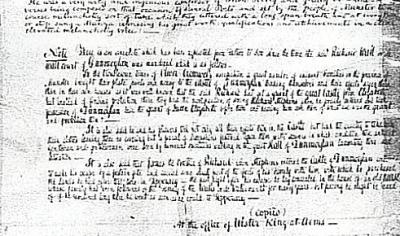
Charles Allen Du Val
His life and works
Richard Wall Of Dunmoylan Castle
Edward Wall was the son of Richard Wall of Dunmoylan Castle, according to the last part of the Du Val Family Scroll that was written by Charles Allen Du Val in 1853.
However his precise descent from the Wall Family of Dunmoylan is unclear. The names of his parents are not stated in the earlier part of the scroll produced by the Ulster King of Arms in 1756. Therefore, although the Wall Family of Dunmoylan does indeed descend from the sons of Robert Du Val (Robert De Valle) of Normandy and is known to have been well established at Dunmoylan by 1270, it has not been possible to draw up a definite pedigree for two reasons. First, the Du Val Family Scroll names the Wall chieftain murdered at Dunmoylan in 1580 as Richard, whereas other (and more reliable) sources give the name as Ulick Wall. Furthermore the writer of the scroll has confused the 1580 murder with alleged forfeiture of the ancestral estates in 1652 when Dunmoylan had been lost to the family for ever in 1580. Secondly, there are no court records giving the names of Crown tenants in the fourteenth and fifteenth centuries when the Earls of Desmond held their own courts, the records of which have not survived.
The record made by Charles Allen Du Val in 1853, by being attached at the end of the 1756 document by the Ulster King of Arms to constitute the Du Val Family Scroll, implies a direct descent by the father of Edward Wall from the head of the Wall family of Dunmoylan (1) who was murdered in 1580:

"There is an anecdote which has been repeated from Father to Son since the time the said Richard Wall or de Wallcourt of Dunmoylan was murdered that is as follows –
In the troublesome times of Oliver Cromwell's usurpation a great number of eminent Families in the province of Munster brought to their plate jewels and money to the Castle of Dunmoylan thinking themselves and their effects safer than in their own houses as it was well known that the said Richard had got a grant of the great Castle from Elizabeth but instead of finding protection there they had the mortification of seeing Richard Stephens when he forcibly entered and took possession of Dunmoylan tear the grant of Queen Elizabeth before him and hearing him ask them of what use was the grant of protection then?
It is also said he and his followers took not only these effects then in the Castle but had the cruelty to take their clothes leaving them no covering but a parcel of Sheepskins fastened upon them with scewers which condition the Gentleman and gentlewomen were seen by numerous spectators walking in the great Hall of Dunmoylan lamenting their situation".
However, whatever the events that began this traditional story, they can not relate to the situation at Dunmoylan in 1652, as the Wall family had by then lost their estates there, and probably gone to live in Limerick where the head of the family had become a merchant (2).
In another part of the 1756 portion of the Du Val Family Scroll, the remarkable and noble character of this Richard Wall is vividly recounted. It relates how "he was a Gentleman of wonderful generosity and bounty - mirth cheerfulness in conversation - easy of address - charitable in his deeds – a learned and profound Chronologer - an incomparable warrior - He was a great master of that kind of wit which it is said cannot be acquired - ready and humorous in his sayings in which he did not fault in the least even to his dying hour for being ordered by his murderer to fix his head upon the block he told him he might do that himself as he could see to do it [better?]
He was a very witty and ingenious composer of Irish Poetry and greatly lamented – m[an]y verses being composed on that occasion by several Poets and set by the people of Munster to a coarse melancholly sort of tune which they lettered with a long span breath and at every [place?] or stop sung a Stanza expressing his great worth, qualifications and achievements in a clear elevated melancholy voice".
(1) The writer of the 1756 portion of the Du Val Family Scroll called him Richard Wall, whereas other (and more reliable) sources names him as Ulick Wall.
(2) The Wall Family in Ireland 1170 to 1970 by Hubert Gallwey (1970) page 184.
